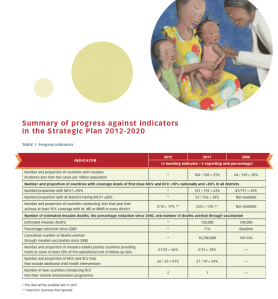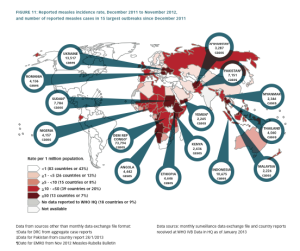Quick look: The Measles & Rubella Partnership Annual Report 2012
Dear Friends,
As we embark on World Immunization Week 2013, we’re reminded of the successes and potential benefits of immunization, and of the tremendous work we still have before us. Within the broader immunization agenda, the world has made firm commitments to reduce measles deaths, and to control and eliminate measles and rubella infection in most regions. These are now integral goals of the Global Vaccine Action Plan and the Decade of Vaccines.
The measles vaccine was licensed 50 years ago in the United States. As usage has expanded, the vaccine has contributed to stunning achievements in public health.
- More than 10 million lives have been saved since 2000.
- The Americas eliminated measles in 2002 and using the measles, mumps and rubella vaccine, recorded the last endemic rubella case in 2009.
- The Western Pacific Region is on the verge of eliminating measles.
- 84% of young children globally received measles vaccination in 2011.
- 105 million doses of measles vaccine were delivered in campaigns during 2012.
- 150 countries will have introduced a two-dose measles vaccination schedule into their routine immunization systems by the end of 2013.
 Yet despite this progress, we are in danger of missing the measles mortality reduction and elimination goals. Countries have committed to reduce measles deaths by 95% from 2000 levels by 2015, and still 430 children died every day from measles-related complications in 2011. The resurgence of measles in Europe and the Eastern Mediterranean is putting the 2015 elimination targets for those regions in jeopardy. Much more work is required to increase routine immunization levels, conduct high-quality vaccination campaigns and to introduce a 2nd dose of measles vaccine in many African countries, which aim to eliminate measles by 2020.
Yet despite this progress, we are in danger of missing the measles mortality reduction and elimination goals. Countries have committed to reduce measles deaths by 95% from 2000 levels by 2015, and still 430 children died every day from measles-related complications in 2011. The resurgence of measles in Europe and the Eastern Mediterranean is putting the 2015 elimination targets for those regions in jeopardy. Much more work is required to increase routine immunization levels, conduct high-quality vaccination campaigns and to introduce a 2nd dose of measles vaccine in many African countries, which aim to eliminate measles by 2020.
In addition, we have observed an increasing trend of measles among older children and adolescents in many countries. We must use the epidemiological information at hand to plan outbreak responses and, most importantly, to implement longer-term strategies to ensure high population immunity across all age groups.
Measles is one of the original six EPI vaccines – an “old” vaccine that remains one of the most potent in the vaccine arsenal. As we address the final hurdles to eradicate polio, we must keep each of our global immunization commitments in clear focus. Chasing measles outbreaks is costly to families and health systems. While measles moves fast, we can move faster to fill the immunity gaps.
This World Immunization Week, the Measles & Rubella Partnership (M&RP) is launching its annual report publicly for the first time. The report highlights the gains made in measles and rubella control and elimination in 2012, while providing a clear picture of the work left to do in 2013 and beyond if we are to reach the 2015 and 2020 Global Vaccine Action Plan targets.
 The M&RP is also pleased to announce a new Outbreak Fund, to which GAVI-eligible countries may apply for assistance to control acute measles outbreaks. This fund of $55 million ($15 million in 2013 and $10 million each year thereafter through 2016) is made possible by a grant from the GAVI Alliance. The Outbreak Fund is available to rapidly respond to outbreaks early, with the objective of containing or stopping the outbreaks in circumstances where there is an acute shortage of financial resources to respond on a timely basis. The standard operating procedures for countries to request support are available here at the M&RP website.
The M&RP is also pleased to announce a new Outbreak Fund, to which GAVI-eligible countries may apply for assistance to control acute measles outbreaks. This fund of $55 million ($15 million in 2013 and $10 million each year thereafter through 2016) is made possible by a grant from the GAVI Alliance. The Outbreak Fund is available to rapidly respond to outbreaks early, with the objective of containing or stopping the outbreaks in circumstances where there is an acute shortage of financial resources to respond on a timely basis. The standard operating procedures for countries to request support are available here at the M&RP website.
Measles indeed moves fast. We know how to move faster. We can afford to move faster. Given the continued measles outbreaks and deaths, we simply must move faster.
Sincerely,
- Dr. Myrna Charles, American Red Cross
- Dr. Lisa Cairns, U.S. Centers for Disease Control and Prevention
- Dr. Robert Kezaala, UNICEF
- Ms. Andrea Gay, United Nations Foundation
- Dr. Peter Strebel, World Health Organization
The Management Team of the Measles & Rubella Partnership.




















 Prelude Version 2.3.2
Prelude Version 2.3.2